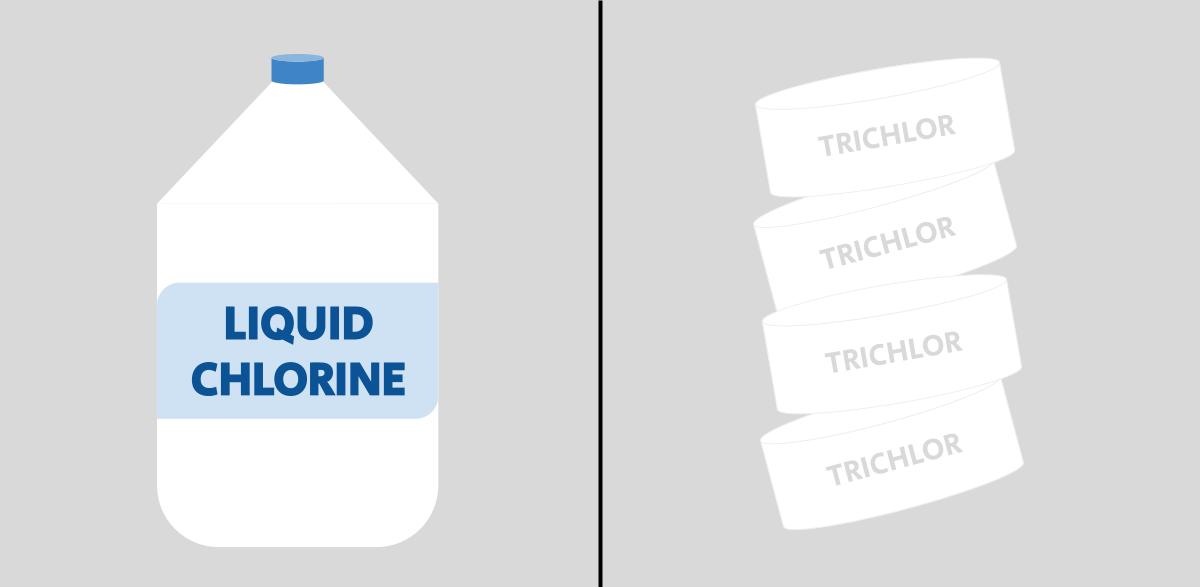Liquid Chlorine Vs. Tablets: Should You Make the Switch to Liquid?

There isn’t a better feeling than having a crystal-clear pool. One of the main reasons for that clean water is chlorine. While choosing chlorine shouldn’t need explaining, the type of chlorine can be a little more confusing. The more popular forms are liquid chlorine and tablets.
While they are both forms of pool sanitizers, liquid chlorine and tablets are different ways to sanitize your pool.
So, which is better for long-term use? Do you know the secondary effects of each? If you are questioning making a switch to liquid chlorine, consider both the similarities and differences of each.
Liquid Chlorine
Liquid chlorine, scientifically known as sodium hypochlorite, is typically used as a disinfecting agent. You might know it better as household bleach. In fact, they are similar in every way, except the concentration strength you buy them in.
Chlorine for pools is typically 10 – 12% concentrated strength, while bleach is around 6%.
If you do buy household bleach for your pool, make sure it is scentless and free of fragrance additives. It should be as “plain” as possible so as not to add anything unnecessary to the water.
Advantages of Liquid Chlorine
- There are no additives or effects on other chemistry levels. Using liquid chlorine will only increase chlorine levels.
- Due to its widespread use, it is available in many big box stores and most pool stores.
- It is relatively cheaper compared to other forms of chlorine. With the recent shortages of trichlor tabs, chlorine jugs have become a more economical choice due to their lower cost.
- It is fairly easy to use and add to your pool. The only requirement is to measure what is needed.
- Liquid chlorine is the preferred chlorine choice for shocking your pool.
Disadvantages of Liquid Chlorine
- Liquid chlorine will degrade over time. If stored at higher temperatures, chlorine strength can be cut in half after only a few months. If you plan on buying in bulk, ensure it’s only for the current season, as the strength will be severely lessened when used.
- Since liquid chlorine mostly comes in gallon containers, it can be quite cumbersome when purchasing multiple jugs.
- Since it is unstabilized, more liquid chlorine is needed to sanitize than tablets and pucks.
Chlorine Tablets
Tablets are most typically found in 1-inch or 3-inch size pucks. The most common chlorine tablet is made from trichlor, a highly concentrated form of chlorine. In fact, trichlor tablets can contain up to 90% active chlorine! There are also tablets made from dichlor.
They are super convenient and slow-dissolving, so they last longer when put into a pool floater.
Fits Up to 5 Pieces of 3-Inch Chlorine Tabs
Tablets also contain an active stabilizer, cyanuric acid (CYA), that can affect overall pool chemistry if used too much.
Advantages of Tablets
- Trichlor is highly effective. At 90% concentration, less is required compared to liquid chlorine or granular chlorine.
- Almost every pool store and big box store in the country will have tablets available.
- It has a very long shelf-life. Rarely will it lose its overall strength over time.
- It is super convenient and easy to work with. You essentially just throw the recommended amount of tabs in your dispenser or chlorinator and that is all there is to it.
Disadvantages of Tablets
- Since trichlor is acidic, constant use of tablets will lower pH and total alkalinity (TA) levels. You must be vigilant and stay on top of testing or else your pool water can become too acidic, which can lead to corrosion of equipment and staining.
- Being a stabilized form of chlorine means that CYA will be added to the pool with each tablet used. Trichlor is over 50% CYA by weight, so levels can rise pretty quickly. Higher levels of CYA will force you to use even more chlorine and the cycle will not end unless some water is drained. See more about the chlorine lock phenomena.
- Trichlor can only be used for daily chlorination. It should not be used for shocking the pool. As mentioned above, trichlor is slowly dissolving and the addition of CYA will take even longer for the chlorine to burn off.
Should You Switch to Liquid Chlorine From Tablets?
Using liquid chlorine as your everyday sanitizer is highly recommended. Tablets should not be the primary chlorine source.
The biggest reason is that liquid chlorine does not affect any testing parameters other than chlorine levels. CYA can only be lowered by draining some water which is not always an easy option.
However, you can use liquid chlorine and tablets together. For example, if you have a high pH and low CYA, tablets will help balance those parameters.
They can also be used during times when the pool might not be monitored daily. If you are going away for a few days or even on vacation, tablets are a great way to stretch out the chlorine dosage.
But, the bottom line is overuse of tablets can cause unnecessary water issues that may lead to unhealthy water and potential algae growth. That’s less time in the pool for you and your family!

